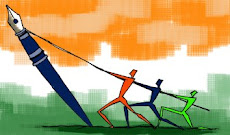Attendees: Aishwarya, Badhri, Shabnam
Topics put forward for discussion:
1. What are the contents that can go on the blog
i. An ancillary blog was started to store any information that we deem important for our endeavor.
Visit the blog here.
ii. It was agreed upon that we need to update the blog on a regular basis to ensure that it does not get mothballed.
iii. It was decided to update the objectives and guidelines section of the blog to ensure that new and potential members get a clearer understanding of our objectives.
2. Discussion on Anand Bharthi
What is Anand Bharthi?
It is an NGO-cum-school whose primary objective is to target the girl children of economically deprived families who missed out on early-stage education and ramp them up on education along with some vocational and extra-curricular courses to open up more remunerative options.
At least that is what is known of them as of now.
i. It was decided to gather information on what are the objectives of Anand Bharthi, what are the problems it is facing, what are the ways we can help to improve things for them
ii. It was decided that Badhri will follow up with people at Anand Bharthi to get an appointment for a visit to their place. He would also let them know of the purpose of our visit.
3. Plan for activities that we need to take up
i. Shabnam put forward the activity of conducting sessions for government college students and the IT schools (run by Satyam Foundation) The topics would be communication, interview and group discussion skills, primer on customer care or BPO jobs and resumè preparation.
ii. Badhri's suggestion, which was agreed upon by everyone, was that before taking up this activity we, ourselves, need to be prepared in terms of what is background of the target audience and gauging their interest levels and a template of what aspects of the aforesaid skills the sessions will specifically target.
iii. Shabnam is responsible for finding relevant information from Subba Rao (Satyam Foundation) regarding the background of students at IT schools, the curriculum at the school, what are the type of jobs they get after training and how useful this session will be to them.
iv. Some of us will be visiting the government college in Old City to interact with the students there. This interaction will aim to find out the background of students there and their interest in such a session. For this interaction, we will need to prepare a preliminary presentation (not necessarily computer/projector based) which will tell the students of the highlights of the course, the take-away and how it is going to benefit them in getting jobs or admissions.
Views expressed (is open to individual interpretation; individuals are free to edit their own opinions)
Badhri:
The activities we choose should always conform to a specific framework (example, spreading awareness) and the solution the activity offers should address the problems defined in the framework.
To the extent possible, we have to ensure that the activity should be applicable not only to the specific beneficiary, but also be applicable and repeatable to a different beneficiary at a different point of time.
The time and effort an activity might ask for should be measured up against the value it adds to the core objective of improving the standard of living. This should be an important metric to consider while deciding or choosing or rejecting an activity.
Shabnam: We need to get going on some activities. This will enable us to get a clearer picture and help us in charting our course of action. At the same time we need to ensure that we do not jump from one activity to another which will just result in token work amounting to nothing.
Aishwarya: We need to maintain a balance between thinking and doing. Both are equally important. Reactive steps or activities will lead to loss of focus and reduce our potential output. It will also delay any existing activity that we have taken up. At the same time, we ourselves need a clearer picture and for this we need to be "among the works". We may not lucky to be first-time correct. Iterations will bring out a well-shaped product/plan/solution.
Powered by ScribeFire.










